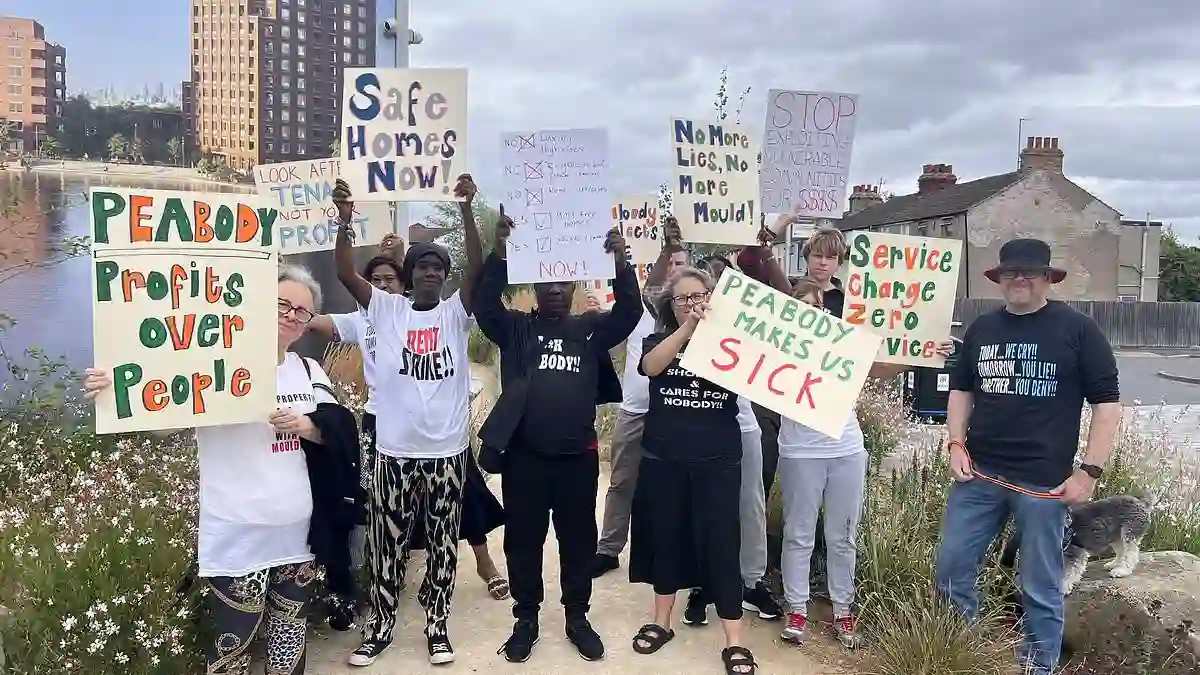A quiet corner of South East London, once made famous by Stanley Kubrick’s A Clockwork Orange, has now become the backdrop of a very different scene — a community protest.
Over the weekend, local residents staged a sit-in at the Lakeside Centre in Thamesmead, raising their voices against what they say is a gentrification scheme threatening to erase their homes, their history, and their identity.
Locals Say Regeneration Is Driving Them Out
The protest was in response to a massive redevelopment plan that would see the Lesnes estate, which currently houses 816 homes, torn down and replaced with 2,778 new properties.
Many of the residents — particularly those from the area’s Nigerian community, known affectionately as “Little Lagos” — feel they’re being priced out and pushed aside.
Protesters unfurled a black banner with the words “End Art Washing” written in green, calling attention to what they believe is the use of art spaces to mask the deeper issue of forced displacement.
Community Members Claim It Feels Like ‘Ethnic Cleansing’
Esther Ovba, one of the protesters and a member of the local Nigerian community, didn’t hold back when speaking to The Guardian.
“Some members of the community are being moved to other areas like Rochester and Gillingham and more white, middle-class people are moving in.
To me it feels like ethnic cleansing,” she said.
This sentiment echoes wider concerns from long-term residents who feel they’re being systematically replaced under the banner of regeneration.
The Area’s Deep Cultural and Cinematic Roots
Thamesmead’s Lesnes estate isn’t just another part of London — it’s a piece of cinema history.
It gained international fame as the backdrop for the 1971 dystopian classic A Clockwork Orange.
The area was originally hailed as the “town of tomorrow” when it was built in the 1960s.
With the Elizabeth Line now offering quicker access to central London, the estate has become increasingly attractive to developers — and wealthier commuters.
Arts Centre Occupied in Symbolic Protest
On Saturday night, seven protesters entered the Lakeside arts centre, where more than 40 artists currently live and work.
While it was a brief occupation, it made a clear statement.
Some residents argue the arts centre — run by Bow Arts in partnership with Peabody — doesn’t serve the actual community anymore, claiming that many of the artists aren’t even local.
Bow Arts responded by saying properties at the centre are offered first to people living in the London Borough of Bexley.
Peabody and the Council Defend the Redevelopment Plans
Despite growing frustration from locals, housing association Peabody — which is spearheading the project — says the regeneration is meant to revitalise the area, not displace it.
John Lewis, Peabody’s executive director for sustainable places, said the association has invested millions into community buildings, cultural spaces, and green areas since 2014.
He emphasized their commitment to keeping the community together, promising that current residents will be offered brand-new homes at social rent prices.
What Are Residents Being Offered?
According to Peabody, those currently living in social rented homes will be able to stay in the area under similar rent conditions. For homeowners, the options include:
-
Buying a similar 1960s home nearby
-
Moving into one of the new homes in the new development
-
Receiving a 35% equity boost or deposit to help buy a different local property
Still, many feel that while the offers look good on paper, the reality may be quite different once bulldozers move in.
Council Acknowledges the Anger — But Hands-Off Approach Raises Eyebrows
While the Bexley Council isn’t directly managing the project, it has granted outline planning permission.
A spokesperson acknowledged that residents’ concerns are valid, saying:
“We remain committed to supporting residents and ensuring that their voices are heard throughout this process.”
However, locals argue that this “support” feels passive as major decisions are left in the hands of Peabody.
A Fight Over Homes, Identity, and Representation
This isn’t just a fight over buildings — it’s a battle for cultural survival.
For many residents of the Lesnes estate, especially within the Nigerian community, the redevelopment isn’t just about improving housing.
It’s about preserving a community that has existed for decades.
With the case now referred to the Secretary of State, the future of Thamesmead’s Lesnes estate — and its people — still hangs in the balance.
